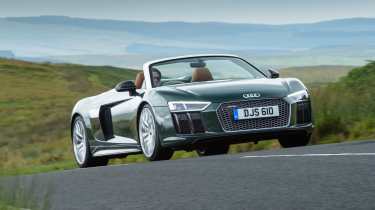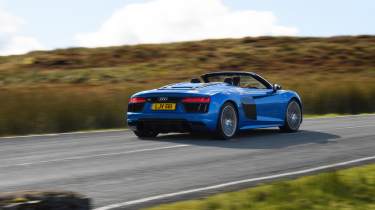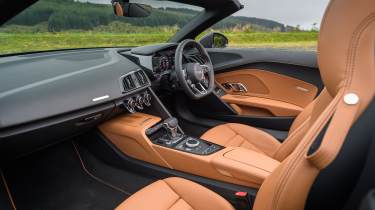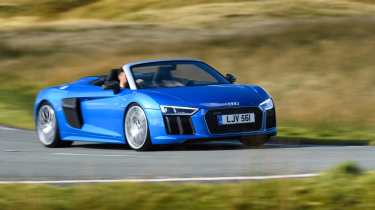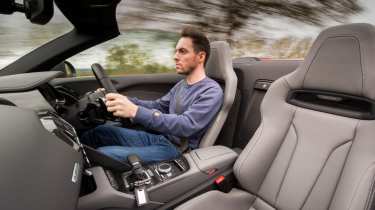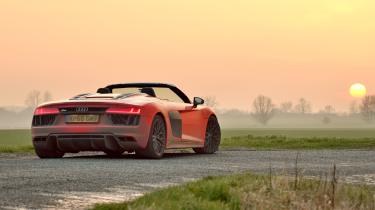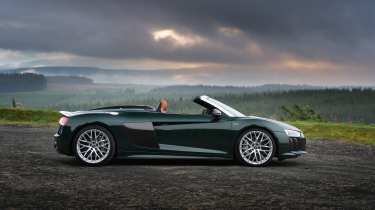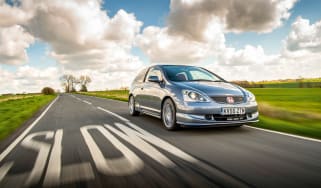Audi R8 Spyder (2016 - 2024) review – that V10 in surround sound
The Audi R8 Spyder is a front-running soft-top supercar and its surprisingly sturdy structure preserves its driving appeal
The second-generation Audi R8 Spyder defied conventional wisdom, which had it that a dynamically talented supercar will be ruined in the process of lopping its roof off. Quite to the contrary, Audi’s soft-focus supercar lost very little of its driving appeal when it went alfresco, thanks mostly to the Audi Space Frame (ASF) aluminum chassis, which made use of a carbon centre cell.
Joining the second-generation R8 range in 2016, the R8 Spyder was offered first in ‘standard’ V10 form, with the basic 533bhp on call, sent to all four wheels via the ubiquitous seven-speed DSG gearbox and Quattro AWD system. A nice visual detail on the Spyder was the alloy vents atop the roof lid, onto which the buttresses of the fabric roof fold when it’s up. Not so nice, the afterthought vent added between the rear lights. The Spyder also got a revised rear diffuser, tweaked to assist in reducing lift and producing as much as 100kg of downforce at maximum speed.
R8 V10 Plus spec came to the R8 Spyder a year later in 2017, with the full 603bhp wallop, new wheel options and a tasteful carbon lip spoiler at the rear. Rounding out the first phase of the second-gen R8 Spyder was, for the first time, a rear-wheel drive version, in the limited-run R8 Spyder RWS.
The R8 Spyder was updated along with the rest of the range in 2018, the facelift landing about as awkwardly with the soft-top as it did the coupe. The lineup was also expanded, with the R8 V10 Performance Spyder being joined by the R8 V10 RWD Spyder and RWD Performance Spyder. Probably the key improvement to the facelifted cars is the revised, more precise steering – better but not night and day in terms of feel.
More reviews
Group tests
In-depth reviews
Reviews
- Audi R8 Spyder (2016 - 2024) review – that V10 in surround sound
- Audi R8 V10 RWD and R8 RWD Performance (2020 - 2024) review – Audi's 911 GT3 fighters
- Audi R8 V10 GT RWD (2022 - 2024) review – the R8 bows out in spectacular style
- Audi R8 4.2 FSI V8 quattro (2007 - 2015): review, history and specs of an icon
Unlike McLaren and Ferrari but in-line with Lamborghini and the Huracan with which it shared a platform, Audi stuck with a fabric roof for the R8 Spyder. Its cloth cap weighs 44kg and can open or close in under 20 seconds at speeds of up to 31mph and was available in a choice of three colours.
> Audi R8 V10 RWD and R8 RWD Performance (2020 - 2024) review – Audi's 911 GT3 fighters
Weighing just 8kg more than the coupe’s at 208kg, the second-gen Spyder’s aluminium frame was 55 per cent stiffer than the first-generation soft-top R8 and was better optimised for the role of being a roadster with improved longitudinal and transverse rigidity. As a result, the R8 Spyder’s driving dynamics are minimally compromised. Overall the second-gen R8 was 25kg lighter than the first-gen R8 Spyder, and 80kg heavier than its second-gen coupe equivalent.
As on the coupe, desirable options on the R8 Spyder included the carbon ceramic brakes (standard on the Plus) and magnetic ride adaptive dampers. Not so desirable an option was the famously flawed original dynamic steering system that, while direct at speed and easy when manoeuvering, was bereft of meaningful feel.
You definitely want the sportier bucket seats too, given the main foible of the R8 Spyder throughout its run was its driving position. To accommodate the folding roof the rear bulkhead was moved forward, the result being you can’t get the seat base far enough back, nor the back of the seat to recline enough. Our long term test R8 Spyder (non-Plus) fitted with optional bucket seats was a better, if still not perfect, combination. Otherwise, the inside of the R8 Spyder is per the coupe, nicely put together, common sense, a little dull and German and a little too ‘normal Audi’, especially in the region of the tiny plastic shift paddles.
A quick note on the first Audi R8 Spyder, which arrived late in the original R8’s life. On sale for just over four years, the split between pre- and post-facelift R8 Spyders is roughly equal. What isn’t, is the split from V8 to V10, the latter being the much more popular mill among drop-top buyers. The first R8 Spyder was not so accomplished by comparison to its coupe counterpart as the second generation. A more old-school convertible, with old-school convertible compromises, a manual R8 coupe is still the driver’s choice.
What we said
‘Roof in place you’ll be hard pressed to tell the second-generation R8 Spyder apart from the coupe when it comes to driving. On the practical side of things there is next to no noise penalty with the roof closed, with wind and tyre roar kept to a minimum, but you can still hear that wonderful V10. Lower the rear window between the seats and the noise is amplified further still.
‘On poor UK roads the steering column will rumble in your palms more so than it does in an aluminium-roofed equivalent, and if you catch a poor surface or a lump in the road with the chassis under serious load you’ll catch the faintest of wobbles through the body. Its damping manages the ride with clarity, rarely phased unless presented with a damaged surface and flows with precision and reassurance. It’s not as rigid as the carbon tub of McLaren’s 570S at the limit, but it’s much steadier, more controlled and surefooted than AMG’s GT C roadster or Ferrari’s 488 Spider.’
‘A near three-second 0-62mph time and a 203mph maximum are serious numbers, especially so when you consider an R8 with no roof weighs 1695kgs (the fabric roof weighs 44kgs).’ – Stuart Gallagher, 2017
9667 miles in an Audi R8 Spyder
‘Knocking about in a drop-top supercar for half a year is likely to sit pretty high up on any petrolhead’s bucket-list. Running an R8 Spyder long-termer was, of course, a brilliant experience – one I may never be lucky enough to repeat. But before I get into the many reasons why it was such fun, there are a few (decidedly first-world) irritations I want to air.
‘My first complaint relates to the attention a car like the Spyder gets out on the road. Mostly the waves and the thumbs-ups and the friendly comments are all quite fun, but what I could have done without was the steady stream of morons who were determined to lure me into a street-race on motorways and dual carriageways.
‘Then there was the fact that a car such as this stands out wherever it’s parked. I was always nervous about leaving it out on the street overnight (living in a city, I had no other choice), a concern that was realised one morning when I found the driver’s window had been smashed. Unless you happen to have secure parking wherever you go, I suspect that underlying nervousness is, sadly, part of the supercar ownership experience.
‘There were a few annoyances relating specifically to the R8, too, notably the uncomfortability of the fixed-back bucket seats (a £3000 option), which I’ve written about far too often already, and the width of the thing, which made certain car parks hell to navigate. It also needed a quiet-start function, as my poor neighbours will attest.
‘Does this all sound a bit moany? Perhaps it does. Regardless, in just about every other sense, running the Spyder was utterly brilliant. How could it not be? I always smiled to myself when I caught a glimpse of it. I made a point of dropping the little window behind the seats on every single journey, no matter how tedious, and stretching the magnificent engine all the way around to the 8500rpm red line, with the exhaust in sport mode, just to let the V10 howl flood into the cabin. There’s no better way to start the day. Or finish it, for that matter.
‘I suggested when the car arrived that this exercise would be more a case of living with a whacking great V10 engine than running a particular car, and it’s certainly true that the motor dominated the entire R8 experience. Once the weather improved, sometime in March, I could actually use the car as its maker intended by getting the roof down. I found that quite a calming experience. I wouldn’t drive the car particularly hard with the hood lowered, but instead would stroke it along and enjoy the sounds and the smells and the fresh air. It isn’t often you can use 533 wild horses to their full potential on the road, so having something to enjoy about the R8 at moderate speeds was a massive boon.
‘The car averaged around 23mpg, with high-20s just about achievable on a long, steady run. It didn’t need a service during its time with us, but it did need a fresh set of Pirelli P Zeros (just over £1000 fitted) before it went back to Audi. Smashed window aside, the R8 didn’t once let me down in any way – which, of course, is how it should be.
‘Having run a bona fide supercar as my everyday car, I’m not certain I’d be in a hurry to do it again. Not because the R8 was in any way taxing – given its massive performance and handling ability, it was actually very easy to use – but because I wouldn’t want to normalise what is actually a very special thing. I think I’d keep the supercar for weekends and driving holidays. After all, eating steak every night would soon wear thin.’ – Dan Prosser
What to pay and buying guide
Alternatives from the same era range from the Porsche 911 Turbo Cabriolet, to the Mercedes-AMG GT C Roadster. While it arrived a little later in the R8’s life, the Aston Martin Vantage Roadster is a good alternative too. An almost direct rival to the R8 Spyder throughout its life came in the form of the more exotic McLaren 570S Spider. The Audi enjoys above all of them, a vastly more emotive and exotic powertrain, its glorious V10 engine unmuffled by turbocharging, which is surely what you want when it’s time to drop the top.
The R8 Spyder as with most convertibles was more expensive than the equivalent coupe when new. Today, the earliest second-generation Audi R8 Spyders from late 2016 can be had from in the region of £70k.
An exotic supercar it may be but the R8 Spyder is also an Audi, so it was built to a certain standard, uses a number of tried and true shared components and benefits from a sprawling dealer and specialist network. Nevertheless, with that V10, AWD, big expensive brakes and fat tyres, a car with evidence of diligent care and maintenance is what you want. Be sure it runs and drives as it should and double check the roof is popping up and down as intended, and that the fabric is in good condition too.
